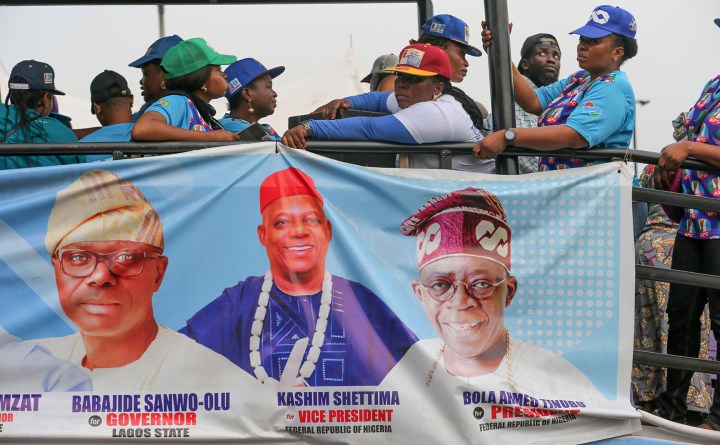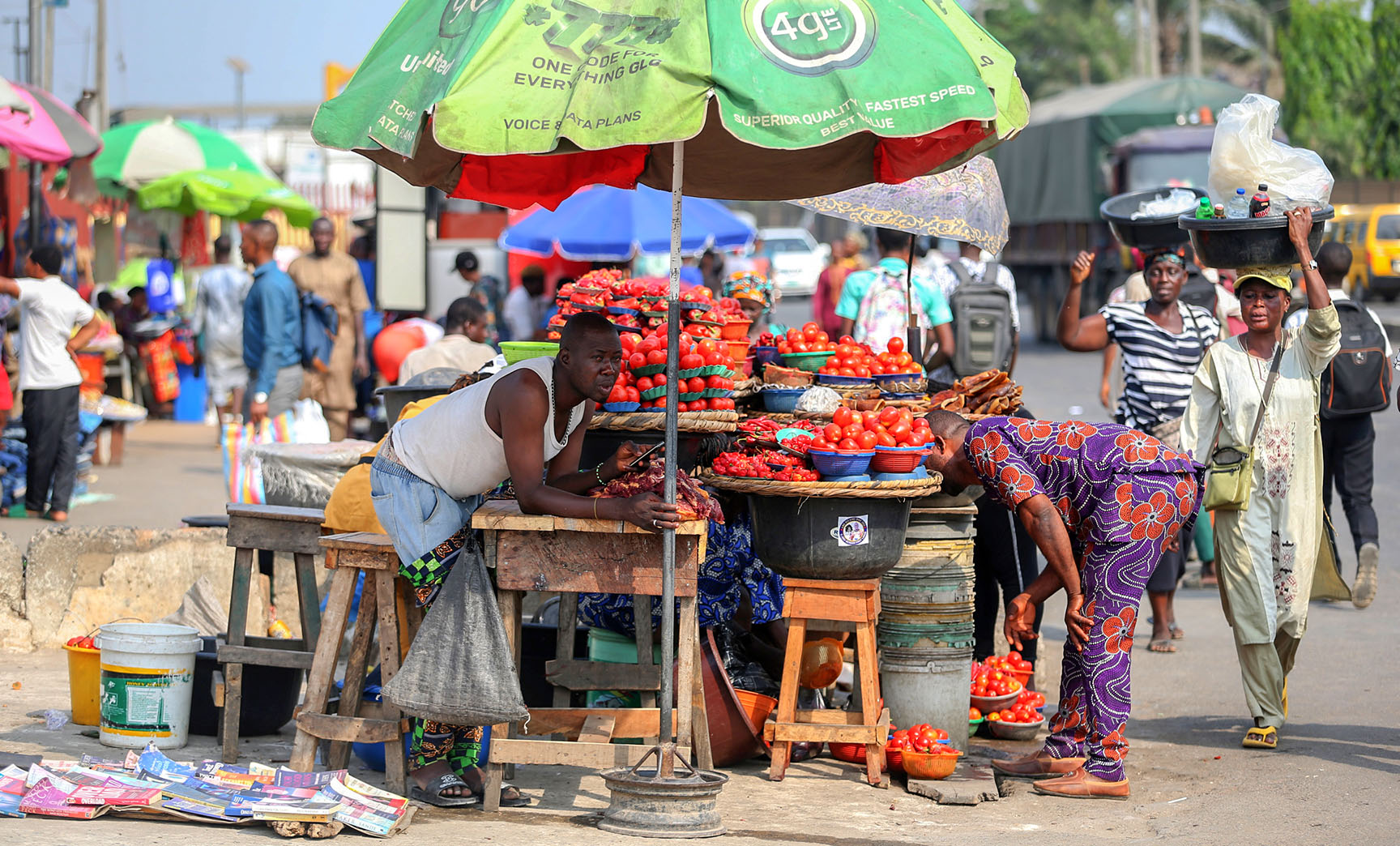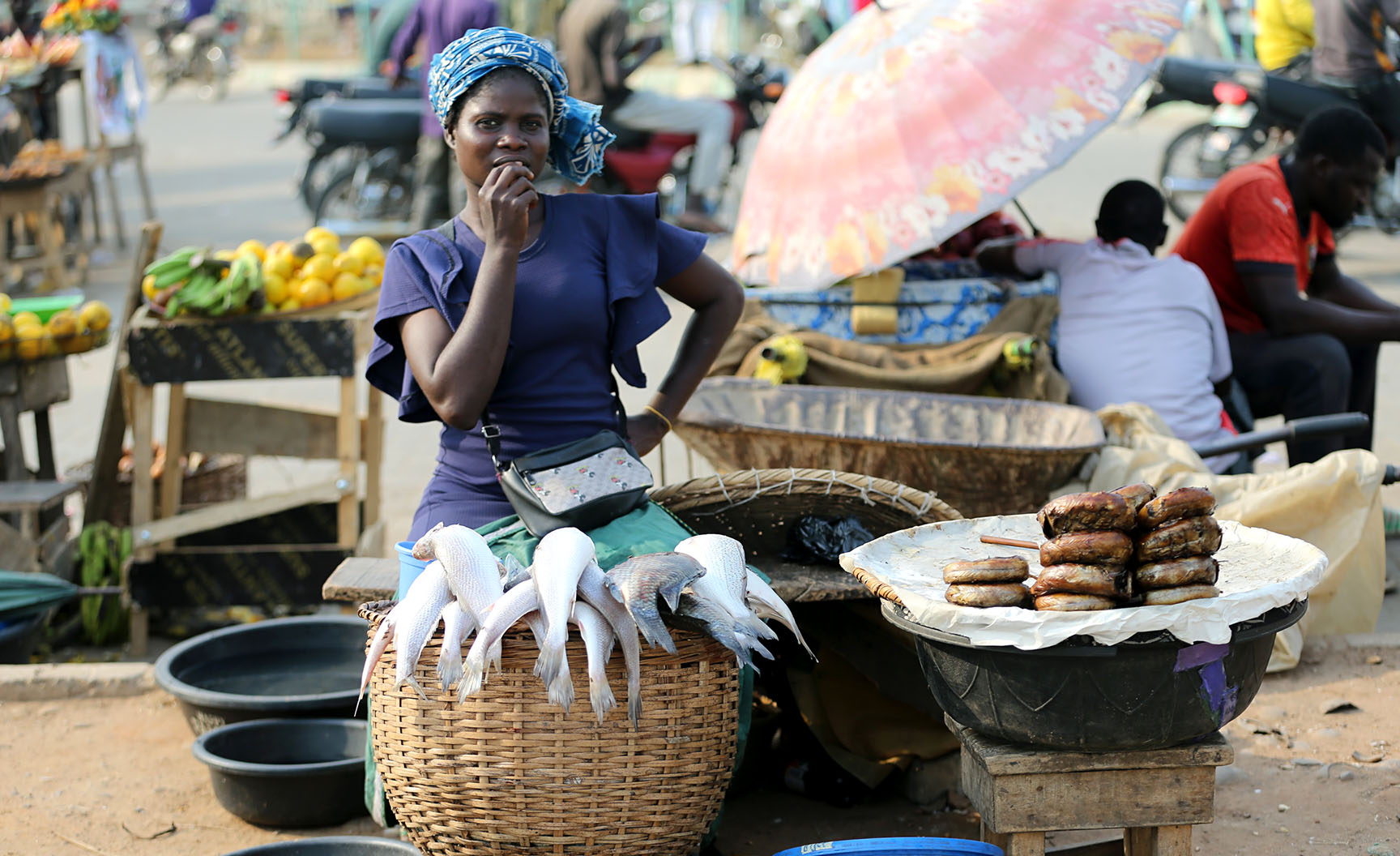ANALYSIS – AFRICA, UNSCRAMBLED
Twilight of an era – As Nigeria’s crucial election closes in, chaos and uncertainty spawn deeply troubled decisions

If the decision by the Central Bank of Nigeria, a few weeks before elections, to engender a political crisis by replacing all the country’s banknotes with new ones was an attempt to blow up Nigeria’s democracy, it could not have been better timed – or more ineptly handled.
How else does one describe the Central Bank’s declaration, without proper organisation, that the entire set of notes in circulation – 2.7 trillion naira ($5.86-billion) – is not money anymore, while printing less than one-tenth of the new notes to replace them?
In a country where only 40% of people have bank accounts and less than 10% use digital money, it is surely a bad joke to tell people to use digital currency.
Or worse, it reeks of Marie Antoinette’s famous “let them eat cake” line.
Dr Jibrin Ibrahim, the director of the Centre for Democracy and Development, described the puzzling decision as a “currency confiscation programme, seizing banknotes from the public and refusing to give it back to them”.
It was a dagger to the heart of the Nigerian economy, a largely cash-run informal sector. Without cash, people were not able to buy food or do their daily business. Banks shut their doors and were stormed; some were burnt down by angry crowds.
The debacle may have been rescued by three northern governors – from Kaduna, Kogi and Zamfara – who asked the supreme court to declare the Central Bank’s plan illegal. The ruling is expected on Wednesday.
Governor of Kaduna state, Nasir el-Rufai, who is one of President Muhammadu Buhari’s closest allies, said he felt compelled to ask why any government would incite its own electorate by taking their money away on the eve of an election. He concluded that “it is very clear that there is a hidden agenda. How evil or how dark that agenda is, only God knows.”

Pepper vendors wait for customers at a roadside market in the Ojodu district of Lagos, Nigeria, on 8 February 2023. The Central Bank of Nigeria on 26 October 2022, announced the introduction of redesigned 200, 500 and 1,000 naira notes into the financial system. But since the notes were unveiled, Nigerians across different parts of the country have had a hard time accessing them from banks and ATMs, affecting the costs of food and transport. (Photo: EPA-EFE / Akintunde Akinleye)
Speaking to the Premium Times newspaper, El-Rufai said that though the policy was “cloaked with the intention of reducing money laundering”, the actual agenda was “to bring trade and commerce and exchange to a halt and make it impossible for the elections to take place or ignite protests so that the entire democratic structure will collapse or lead to an uprising that will invite the military to take over”.
In this scenario, the election would be delayed and an interim government would assume control.
Spanner in the works
The obvious question is to what end was this spanner thrown in the works?
Premium Times, the country’s leading investigative newspaper, blamed the debacle on Central Bank governor Godwin Emefiele and called for his immediate sacking.
But El-Rufai pointed the finger at non-state actors, “those around Buhari”, for pushing the policy because they feared losing power and privileges.
“These are people that prefer to be under the radar but are constantly plotting to preserve power on their own terms,” he said.
Buhari came to power eight years ago, promising to clean up the corruption of the Goodluck Jonathan government, but portions of the Nigerian elite have shown a distinct unwillingness to change their ways and the level of rent-seeking these days could possibly be worse than ever.
Read in Daily Maverick: “A $50bn overdraft is set to become Nigeria’s debt”
El-Rufai blamed those who benefit from the subsidies, the costliest of which is for fuel which accounts for more than the total amount the federal government spends on education, health and social protection; it disproportionately benefits Nigeria’s rich class.
The World Bank complained in November 2022 about the waste, saying the subsidies are not accounted for in the budget which “makes them difficult to track and scrutinise”.
Another major scam that is conducted in full view is that of the two-tier exchange rate, in which the insistence by the Reserve Bank’s Emefiele that exporters convert their dollar earnings into naira at the much lower official rate has been disastrous for traders. The wide spread between the tightly controlled official rate and a parallel real-life market provides endless opportunities for those with connections to profit from the round trip.
Then, there are the oil thieves.
An estimated 200,000 to 300,000 barrels of oil per day are currently stolen in Nigeria – mainly by tapping directly into pipelines – amounting to about a fifth of the country’s total production. Such a massive criminal enterprise, which is bleeding the country dry of revenue and foreign exchange, is only possible with the connivance of some in the military and high-level political and oil industry insiders.
The effect of this oil theft is felt throughout the economy. Oil and gas are still 80% of government revenue, so diminishing oil revenues have forced Nigeria to rely ever more on debt to finance its budget. More than 60% of the Nigerian budget is currently funded through debt.
This rent-seeking is a big part of the stagnation and decline in the Nigerian economy that has so badly hurt the Nigerian people, whether they be middle class or poor.
Give democracy a chance
Peter Obi, the Labour Party candidate and former governor of Anambra, has run an energetic and positive campaign and has become a voice for the frustrated youth of the country. He is also a Christian and from the country’s third-largest ethnic group Igbo, which has been shut off from any real power in the federal government during the Buhari years.
Obi has presented himself as the ultimate outsider taking on the establishment. In truth, all three major candidates come from within the two-party political system that has dominated Nigerian politics in the democratic era. More to the point, they are outside the ring of cronies around Buhari.
People’s Democratic Party candidate Atiku Abubakar, a former vice-president and once one of the wealthiest men in Nigeria, has seen his companies run into the ground because of his oppositional politics and his two-decade-long presidential ambitions.
But if El-Rufai is to be believed, the main purpose of all these disruptions is to prevent Bola Tinubu, the former governor of Lagos state and the candidate of the ruling All Progressive’s Congress, from becoming president. This means that the political class has calculated that Tinubu is both the most likely winner and the biggest threat to their interests.
Visit Daily Maverick’s home page for more news, analysis and investigations
Tibor Nagy, the former US assistant secretary of state, queried whether Buhari or his clique were trying to sabotage Tinubu’s campaign: “People are furious at the chaotic, unorganised circus. Tinubu could be punished by voters.”
Tinubu founded the ruling party with Buhari in 2014, but after he ousted the incumbent Jonathan, the current president marginalised his erstwhile partner. In 2022, the clique went to great lengths to prevent Tinubu from getting the nomination but he managed to wrest the support of a number of northern governors from Buhari – three of whom are now bringing suit against the government run by their own party. Since then, there has been an uncomfortable back-and-forth between the candidate and the Villa, the headquarters of the Nigerian presidency.
Tinubu cannot afford to be publicly at loggerheads with Buhari, who still commands a substantial following in the north-Nigerian vote-rich states of Kano and Katsina, and Buhari appears unwilling to openly challenge the standard bearer of his own party. But the mixed messaging reflects a deep antipathy towards Tinubu by many around the president.
The Tinubu camp claims that, even after the chaos, its internal polling shows that he is 10 points clear of its rivals and is ahead in 28 of the 36 states – 24 are needed to prevent the election from going to a second round.

A woman selling fish waits for customers at a roadside market in the Ojodu district of Lagos, Nigeria, on 8 February 2023. (Photo: EPA-EFE / Akintunde Akinleye)
Public polls have shown Obi ahead, but they are based on phone sampling and many of the poor in the north, which is where the election will be decided, do not have phones.
Read in Daily Maverick: “Nigeria: Chaotic underachieving nation that should be giant of Africa is back in presidential election fever”
Whatever happens, the voters of Nigeria need to make an emphatic statement that the corrupt party is over and the country needs to move forward. It needs to happen without the violence that would play into the hands of those who would like to call the whole thing off.
Speaking of those who still might block change, El-Rufai said they lack any electoral or political legitimacy:
“They can only hide behind the likes of President Buhari to achieve their objectives. What we need to focus on is defeating them and defeating them means having elections and supporting whoever wins.”
One group that is endangered by the twilight of the Buhari era is an ageing cohort of military generals who have remained powerful in the governments of both major political parties, manipulating events from behind the scenes long after the formal end of military rule in 1999.
We might just have witnessed their last stand. DM
Van Niekerk is editor of DM’s Africa, Unscrambled weekly newsletter.




















 Become an Insider
Become an Insider
When I hear comments from South African politicians to the tune of, “We have nothing to lose because we have nothing, so our actions only inflict pain on the rich” they should turn their heads to the North and perhaps ask themselves why refugees are streaming across the SA borders. Here is case in point.
Ah, Africa. Sad, patronising nod. That’s what so many think. And they are right. It’s a culture of ‘get mine’ while the going is good. However, this very same “rent-seeking” happens in the rest of the world. The Haves (and by the Haves, I mean the ‘Haves a lot’) in developed countries are infinitely more sophisticated. Let’s look at the USA. For the past 20 years, the Internal Revenue Service has been defunded, left with insufficient enforcement mechanisms, especially the kind of heft required to go after the truly wealthy. The result? The Middle Class pays for the operation of the US, while the uber-wealthy pay an ever-declining share. (The Inflation Reduction Act of ’22 has funded 87k new IRS agents and will go some way to alleviating this situation). In addition, super-funded organizations such as ALEC (American Legislative Exchange Council), representing corporate interests, literally get to write laws, taken up verbatim in legislation, to benefit the few at the expense of the country. One of the consequences? Oil companies continue to get subsidies while profits reach unimaginably lofty heights. All so sadly familiar. To summarise – this rent-seeking is a world-wide problem to be addressed.